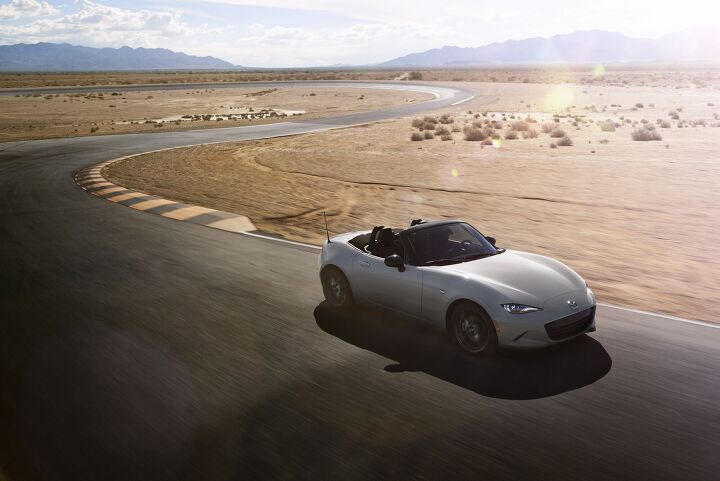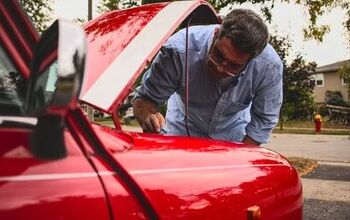5 Expert Tips For Buying A Used Sports Car

Spring is finally here, and with sports car season in the air, thousands of shoppers are hitting the used car market in search of an exciting new ride.
If you’re one of them, be sure to consider the following list of tips and tricks to ensure you wind up with a first-class second-hand sports car. Newer, older, domestic or foreign, the following points apply to virtually all used sports car models.
For maximum confidence, we recommend working backward from an expectations standpoint when considering a used sports car: assume the worst and then confirm otherwise, for the best chance of finding the best example of the used sports car model you’re set on.
Tip 1: Assume The Consumables Need To Be Replaced
Tires, brake pads, brake rotors, and even the vehicle’s clutch can be considered consumable parts, and even more so in a higher-performing sports car. Approach any used sports car you’re considering assuming that it needs new tires, new brakes, and a new clutch until you or a mechanic proves otherwise.
Make sure to include these new parts in your budget.
SEE ALSO: Run Flat Tires: Why You Should or Shouldn’t Buy Them
Tip 2: Assume The Fluids Have Never Been Changed
For maximum long-term peace of mind and durability, assume that all vital fluids in the car you’re considering are overdue for a change until you see service records or receipts that prove otherwise. Fresh fluids are vital to the long-term well-being of any vehicle and even more so in a sports car, which is likely to have been driven hard.
SEE ALSO: Do You Have to Change Your Oil Every 3,000 Miles?
Budget to change any fluids that can’t be proven to be fresh, especially on a higher-mileage vehicle. Don’t focus solely on the popular fluids either: though engine oil and coolant tend to take the spotlight, that used sports car also has transmission, power steering, brake and possibly differential fluid that may all need some attention, too. Remember: fluids are cheap insurance, and you can’t overchange them.
Tip 3: Assume The Vehicle Has Been Used As A Plaything
Unless you know the seller, assume that the vehicle has been driven hard by an overgrown man-child until an inspection proves otherwise.
SEE ALSO: Can I Insure a Modified Vehicle?
Look for body damage and suspension damage, inspect the underside of the front edge of the bumper for signs of careless parking or bottoming out, and assume the vehicle has been struck or involved in an accident until a professional inspection proves otherwise. If the sports car you’re considering has ever been introduced via powerslide into a piece of infrastructure, you want to know about it before you fork over your cash.
Tip 4: Assume The Warranty Is Void
If you’re buying a used sports car with remaining factory warranty, assume that warranty has been compromised and voided until the seller, or a dealer, proves otherwise. Did you know that missing just one fluid change can void the factory powertrain warranty on some vehicles? Ditto going over a timing belt change interval, or making any non-factory modifications to vehicle hardware or software.
SEE ALSO: Should You Buy an Extended Warranty for Your Car?
Check all service records to make sure no servicing or fluid changes were missed, and talk to the service advisor at the vehicle’s dealer, with the VIN in hand, to be certain that any remaining warranty is in good standing.
Tip 5: Assume An Upcoming Repair Bill
Most sellers aren’t trying to jam you with an upcoming repair bill when they sell you their ride, but some are. Whether it’s an issue they’re aware of or not, a Pre Purchase Inspection (PPI) by a qualified mechanic of your choosing is the best defense against pricey surprises from your new-to-you vehicle.
SEE ALSO: Top 10 Reasons Why Your Check Engine Light is On
A PPI costs about $75 to $150 but can save you thousands while adding peace of mind. Arrange the inspection on your dime, and have the seller meet you at the shop, or see if they’ll let you bring the vehicle in yourself. A PPI takes about an hour — just be sure the technician fully checks all vehicle components and systems and performs an OBD scan, which can reveal issues with powertrain electronics, even if there’s no check engine light.
Become an AutoGuide insider. Get the latest from the automotive world first by subscribing to our newsletter here.

Justin Pritchard, an award-winning automotive journalist based in Sudbury, Ontario, is known for his comprehensive automotive reviews and discoveries. As a presenter, photographer, videographer, and technical writer, Justin shares his insights weekly through various Canadian television programs, print, and online publications. In 2023, Justin celebrated a significant milestone, airing the 600th episode of his TV program, AutoPilot. Currently, he contributes to autoTRADER.ca, Sharp Magazine, and MoneySense Magazine. His work as a technical writer, videographer, presenter, and producer has been recognized with numerous awards, including the 2019 AJAC Video Journalism Award and the 2018 AJAC Journalist of the Year. Justin holds a Bachelor of Commerce (Hons) from Laurentian University, which he earned in 2005. His career in automotive journalism began that same year at Auto123.com. Since then, he has written one of the largest collections of used car buyer guides on the internet. His passion for photography, nurtured from a young age, is evident in his work, capturing the scenic beauty of Northern Ontario. Living in a region with a particularly harsh winter climate has made Justin an expert on winter driving, winter tires, and extreme-weather safety. Justin’s significant achievements include: 2019 AJAC Video Journalism Award (Winner) 2019 AJAC Road Safety Journalism Award (Runner-Up) 2019 AJAC Automotive Writing (vehicle review topics) (Winner) 2019 AJAC Automotive Writing (technical topics) (Winner) 2018 AJAC Journalist of the Year You can follow Justin’s work on Instagram @mr2pritch and YouTube @JustinPritchard.
More by Justin Pritchard






































Comments
Join the conversation
That was a good article with some different ideas.